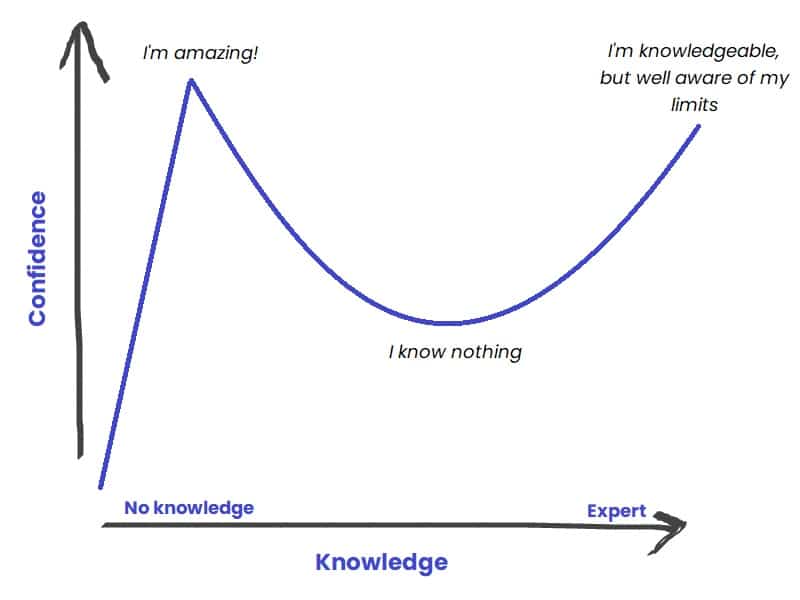We don’t know what we don’t know. Yet, that doesn’t stop us from waxing lyrical about topics we haven’t a clue about. Are you someone who believes you are more skilled than you are? Don’t be embarrassed, we are all prone to exaggerating our skill set and knowledge at times. But did you know it can lead to incompetence?
What makes some people excessively confident with their words when their words are nonsensical? This group of people often hold an inflated belief about their knowledge. A skewed self-awareness can lead to negative consequences in our professional and personal lives.
This article will explain the Dunning-Kruger effect and how to recognize it. It will also outline 5 ways you can overcome this detrimental cognitive bias to improve your life.
What is the Dunning-Kruger effect?
The Dunning-Kruger effect is a cognitive bias that affects everyone. We all suffer from this bias from time to time. Perhaps some more than others, but we are all susceptible.
In short, people who harbor this bias believe they are more intelligent and more capable than they are. They believe they are more skillful than they are. And, they cannot recognize when people have genuine knowledge and ability.
The more I learn, the more I realize how much I don’t know.
Albert Einstein
The Dunning-Kruger effect can cause us to overinflate our knowledge on a subject. We may be experts in one topic, but this does not translate into expertise in another field.
As a result, the Dunning-Kruger effect highlights our incompetence.
What are examples of the Dunning-Kruger effect?
We see the Dunning-Kruger effect in all areas of life.
Tell me, how would you rate yourself as a driver on a scale of 1 – horrific to 10 – masterful?
When it comes to driving ability, most people consider themselves above average. This is the Dunning-Kruger effect at play.
Many of us lack the self-awareness of knowing what type of a driver we are. We certainly can’t all be above average!
Let’s consider this in a different way.
In a work environment, those who suffer from the Dunning-Kruger effect don’t take kindly to constructive criticism during a review. They respond to this feedback with excuses, deflection, and anger. Everyone else is at fault, not them. This perpetuates poor performance and can result in career stagnation.
Studies on the Dunning-Kruger effect
In 2000, Justin Kruger and David Dunning released a paper titled “Unskilled and Unaware It: How Difficulties in Recognizing One’s Own Incompetence Lead to Inflated Self-Assessments”.
As you may have figured out the authors of this study penned the Dunning-Kruger effect following the findings of this study.
They tested participants against humor, logic, and grammar.
The humor study in this research asked participants to rate a series of jokes for what general society would class as funny. Each joke was also given a score from a group of professional comedians.
The participants were then asked to rate their own ratings performance in terms of accuracy against the professional comedians. It is recognized that this test relied on the participant’s connection with the sense of humor of their society.
The researchers found that participants scoring in the 12th percentile in these tests overestimated their abilities. This overinflation was to such an extent that they believed they had the skill and competence of belonging in the 62nd percentile.
This is a classic example of knowing so little, that they didn’t even know that they didn’t know.
The authors suggest that when people are incompetent they lack the metacognitive skills to realize it. Paradoxically improving people’s actual skills lowers their claim on their abilities. It does this by increasing their metacognitive skills which help people to recognize their own limitations.
How does the Dunning-Kruger effect impact your mental health?
This study found a group of participants who performed poorly on a task yet displayed overconfidence in their abilities. This was even after receiving performance feedback on areas for improvement.
Here at Tracking Happiness, we believe personal growth is vital to our well-being. You can read about the benefits of a growth mindset here.
When we believe we are superior in our skill and knowledge, we do not recognize the need for personal growth. We stifle our scope for embracing new opportunities and enhancing our social relationships. This serves to limit our well-being and can even lead to isolation.
As a young adult, I said to my mum: “Mum when I was 18, I thought I knew everything. But now I am 20, I realize I didn’t know everything, but I do now.”
Sheesh, what a fool!
Here’s the thing, no one likes a know-it-all.
People who suffer from the Dunning-Kruger effect lack social skills, particularly the ability to listen. They come across as knowing best, are critical or contradictory of others, and quite frankly, they are no fun at parties. They may feel socially isolated and lonely.
The more I read and learn about topics I am interested in, the more I realize I don’t know. This is consistent with the well-known graphic about the Dunning-Kruger effect:
- When we know nothing, we are more susceptible to overconfidence.
- When we have average knowledge, we feel we know nothing.
- When we are an expert in a subject, we recognize our competence but are also aware of our limitations.

5 tips for dealing with the Dunning-Kruger effect
We all suffer from the Dunning-Kruger effect at some stage in our lives. We know this cognitive bias can limit us socially and impair our ability to learn and grow.
We all want to have an accurate level of self-awareness and for our actual skillset to match what we believe it to be.
Here are 5 ways to help ground yourself and address any leanings you may have toward the Dunning-Kruger effect.
1. Take time to reflect
Reflect on past conversations and experiences. I’m not suggesting for one minute that you dwell or ruminate on them. But be mindful of how you show up in conversations.
- Why do you say what you do?
- Why do you believe what you do?
- What other perspectives are there?
- What is the source of your knowledge?
Sometimes we believe that those who shout loudest have the most knowledge. But this is not the case.
Learn to sit back, talk less and listen more. Hear what others have to say and evaluate the whole picture. Maybe do some research before you jump in with your opinion, wrapped up in a pretty bow of expertise.
2. Embrace learning
Do you know as much as you profess to? What is the source of your knowledge?
Maybe it’s time to put your money where your mouth is.
- Sign up for a course on a subject of interest.
- Conduct online research from all angles.
- Stay up to date with changes in subjects that interest you.
- Engage in meaningful discussions, listen, be open to others, and be willing and able to shift your perspective
Most importantly, read and learn. Then you will soon realize how much information there is for you to still learn. It can be daunting, but you will quickly realize how much you don’t know.
3. Admit you don’t know something
Knowingly pretending to have more knowledge than you do is a sign of insecurity. A little different from the Dunning-Kruger effect.
Make a point of being willing and ready to admit your lack of knowledge, awareness, or expertise in a topic of discussion. We are not expected to know everything.
You can express this in several ways:
- “I’ve never heard of that before. Can you tell me more?”
- “I don’t know much about that. How does it work?”
- “I’m embarrassed to admit I don’t have any knowledge of that. Can you explain it to me?”
Admitting we don’t know something will gain you respect from your peers. It also means you will be listened to more readily when you genuinely have knowledge on a subject.
4. Challenge yourself
Why do we do what we do? Why do we say what we say?
Sometimes we must take a good, hard look in the mirror and challenge ourselves. It can be uncomfortable to question our actions or to highlight our inadequacies. But only then, when we strip away our biases, can we see ourselves for who we are.
Learn not to always take your initial thoughts at face value. Recognize your patterns and thought processes. Do your beliefs cause you to exaggerate your competence?
Take the time to challenge your thoughts. This will permit you to reject ideas that don’t serve you and help you formulate new ones.
5. Ask questions
People who have an overinflated sense of their abilities and knowledge don’t feel the need to ask questions. Ironically, this limits their scope for learning and gaining knowledge.
Make a point of asking questions. Dive deeper into topics and gain a greater understanding.
There is no such thing as a stupid question. Every question leads to knowledge. Embrace your inner toddler and go on a “but why” journey.
What can your friends, family, and colleagues teach you? Instead of believing you are the master of knowledge. It’s time to extract knowledge from all those around you.
Make use of the experts you surround yourself with.
Wrapping up
Confidence in our abilities is good, but not when it is exaggerated. The Dunning-Kruger effect highlights the impact of our belief in our competence. Excessive confidence combined with a low skill level results in incompetence. Beware, we are all susceptible to the Dunning-Kruger effect.
When was the last time you displayed a perfect example of the Dunning-Kruger effect? Or are you self-aware enough to know what you don’t know? I’d love to hear from you in the comments below!


That is kind of wrong at least about incompetent people getting isolated. The opposite is the case and Dunning Kruger expmains why. One just needs to get it by looking at the world.
Actually Dunning Kruger is also an explenation why dumb people are more succesful then bright people.
It is rather bright people end up in isolation and not ‘not-so-clever’ people .
There is a bit of mix up in this article. Basically it is leaving out the other half of the cake, that bright people believe they are not competent.
Also they are often facing being attacted or bullied by those overestimating their own abilities.
This self-doubt and negative exprience with the ‘dumb’ people leads to deopression and withdraw from society.
DK effect can be both. Overesrimating yourself as a result of being incompetent (dumb) or underestimating yourself although being con
competent (bright people).
Hi Ania,
Thank you for the thoughtful comment! I agree with you, there’s another half of the cake. Nonetheless, I hope you found our article informative!
All the best,
hugo